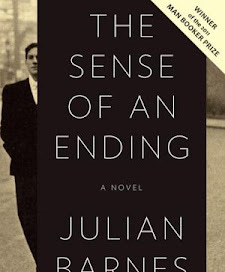The 13 Books You Should Read in 2013
Happy New Year to all! Hope all of you had a happy and safe New Year’s Eve. We took the kids out for dinner (we finally found a Chinese restaurant here that we love!) and then came home to hang out. The kids watched performers I’d never heard of paying tribute to the late, great Dick Clark while I watched the Internet to see how much further we would drop off the fiscal cliff.
As is my tradition, I also snuck in a last minute book, finishing Daniel Gottlieb’s Letters to Sam: A Grandfather’s Lessons on Love, Loss, and the Gifts of Life. This wound up being a good choice to end the year with – very uplifting – and it was the 57th book of the year for me.
That’s down slightly from last year’s totals (which is down from 2010). I’m not quite sure what the story is there, but I’ll have some thoughts and a final breakdown and analysis of the accounting in a separate post, since I know some of you are interested in such details and some could care less.
But for our purposes today, I give you my picks for the Best Fiction Books of 2012. I already wrote about my selections for Best Nonfiction and Memoirs of 2012 so if that interests you, be sure to check out that post, too. As usual, these are books that I read in 2012 … not necessarily ones that were published in 2012, although there were a few of those, too. Links take you to my reviews, if I wrote one.
And, really, it’s just a coincidence that I wound up with 13 books as my “best of” picks for the year just past. I’m not one of those bloggers that ascribes to a set number of books to include on such lists (and if you are, that’s perfectly fine … I love ALL of these kinds of lists, whether or not you have one best book of the year or 100.) I don’t like narrowing these picks down. If I have a great book to tell you about, I want to tell you about it.
So, without further ado, in alphabetical order by author last name:

The Sense of an Ending, by Julian Barnes
From my review: I loved everything about this little book. Usually there’s something that my critical, nit-picky self can find fault with. Not here. The well-defined characters, the gorgeous writing (I could quote from this all day), how Julian Barnes packed SO MUCH into so few pages … it’s so well worth being named the winner of the 2011 Man Booker Prize, and you know me when it comes to book prizes – I kind of eschew them. Take ’em or leave them. But The Sense of An Ending deserves every accolade and then some. (read more)
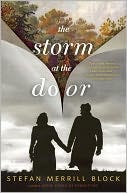
The Storm at the Door, by Stefan Merrill Block

A Christmas Carol, by Charles Dickens
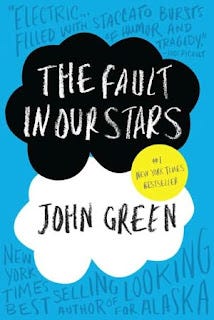
The Fault in Our Stars, by John Green
From my review: Here’s what you need to know about The Fault in Our Stars: It’s the story of Hazel Lancaster and Augustus Waters, teenagers who meet in a most unlikely place – a cancer support group. Hazel has accepted that she is likely to die; Augustus is in remission. The bond between the two … well, it sounds cliche to say that they are star-crossed lovers, a cancer-filled Romeo and Juliet, but it makes sense in the meaning and context of this novel.
And that’s all I’m going to say. Because, as sad and as heartbreaking as the premise may sound, this is an absolute must-read. For teens, for adults, for EVERYONE. It’s a tearjerker, yes. You will cry. But you know what? You’ve cried over more trivial crap, like those who’ve been kicked off America’s Dancing with Survivors and Top Models Who Have No Talent. Am I right? The Fault in Our Stars is a story about love and risk and the unfairness of life and it is simply brilliant in every way. It earns and is more than worthy of your tears. (read more)
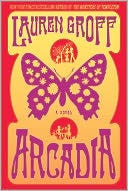
From my review: “He understands, with a feeling inside him like a wind whipping through a room, that when we lose the stories we have believed about ourselves, we are losing more than stories, we are losing ourselves.” (pg. 208)
If you fancy an introspective, deeply layered and nuanced character-driven story told from the perspective of a young boy named Bit who lives with his parents (and a host of other creatively named characters) on an upstate New York commune during the early 70s, then you’re in luck.
Arcadia‘s a different kind of book, extraordinary from the likes of some that passes for contemporary fiction….Groff’s prose is absolutely poetic and draws her reader closer in an enchanting way, almost parallel to the book of Grimm’s Fairy Tales that Bit finds as a child in the dilapidated mansion on the Arcadia grounds. Indeed, there are fairy tale elements throughout Arcadia – witches in the woods who transform into benevolent grandma types, bad guys set to do evil, a king (Handy, the cult-like leader of Arcadia) that lives a life of luxury (i.e. traveling around doing concerts and consorting with various women) while his minions work their asses off. (read more)
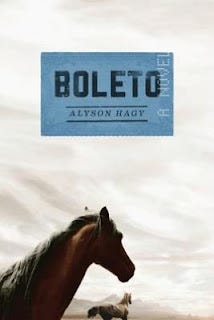
Boleto, by Alyson Hagy (2012)
From my review: The writing in Boleto is so exquisite that I just want to quote from the text. What I have to say doesn’t much matter. Right off the bat, one notices that Boleto is going to be a rich read of characters and their complex relationships to each other, as well as to the changing Wyoming land that they live on and love. The main character is 23 year old Will Testerman, a quiet, somewhat mysterious but gentle soul who has made a few mistakes in his young life and caught a few unlucky breaks. He’s so incredibly broken inside and Hagy’s skill as a writer is making her reader want to reach through the pages to heal him.
Because that’s what Will struggles to do with the broken people in his life, starting with his mom, a cancer survivor. (Honest to God, can I not escape cancer these days?)
“His mother was a schoolteacher in town. He believe he owed some of his restlessness to her. She had taken on full-time work when he was old enough to go to school, and the two of them had driven to and from Lost Cabin for many years, It was a short drive but in those minutes together – often in the blue cold of a winter morning – they would talk about their days, about who they were. His mother had traveled some when she was young. She was also a great reader of books.
She would say to him, Who are you today, Will Testerman?
And he would say, if he wished to disappoint her, Today I hate arithmetic.
More often he would say a thing to entertain her or to warm up the teacher in her. He would say, Today I am a minuteman from Massachusetts, or Today I am the man from over there in France who discovered germs. It wasn’t hard to please his mother or to make her laugh. This was true even after a difficult day, one that left a grayish color around her lips. She only wanted to talk to him. She only wanted him to know how big the world was.” (pg. 6-7) (read more)
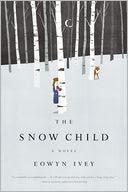
The Snow Child, by Eowyn Ivey
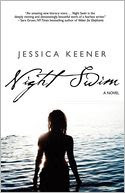
Night Swim, by Jessica Keener
From my review: Jessica Keener captures so precisely the inner emotions of a teenager who has lost a parent that it is natural to assume (as I did) that this element of Night Swim is completely autobiographical. It is not (it’s based on Keener’s experience with a close friend) and to be able to render that so perfectly in fiction is just one of the reasons why this makes Keener such a talent and a writer worth watching.
Keener has the ability to seamlessly change the novel’s tone to fit the scene, and that’s a trait that sometimes even much more supposedly seasoned writers have difficulty accomplishing. For example, while reading the descriptions of Sarah’s mother’s funeral and shiva, my initial thoughts were that the tone felt flat … and then I thought: of course it feels flat. It needs to feel that way because at such a time your world IS flattened. YOU ARE emotionally flattened.
What gives Night Swim its authenticity are the little, minuscule details surrounding a parent’s death (or really, any significant loss) that Keener weaves into Sarah’s story.The way teachers pause when saying your name while taking attendance when you come back to school the week after your parent dies. The quick, stealth-like glances that other students give you in the hallway right before their eyes avert from yours.
And if the little details contained within give Night Swim its authenticity, it is the big themes that gives Jessica Keener’s debut novel the power to become one of the defining coming-of-age novels of our time and the potential to become among the classics in this genre. There is an element of Night Swim that truly feels reminiscent of the work of Judy Blume, and knowing what a revered icon in literature Ms. Blume is (to myself included), I don’t say that nor draw that comparison lightly. But it’s there, and it exists, and although I am not a big young adult novel (YA) reader, of those such novels I have read I cannot recall any modern YA/coming-of-age novel that has so poignantly reminded me of what I believe to be the standard-bearer.
Because like Judy Blume, Jessica Keener tackles the big themes and the larger societal, cultural issues – the dysfunctional disconnect of a family before and after a tragic loss, anti-Semitism, racism, Vietnam, feminism, one’s emerging sexuality and personal experimentation – and connects them throughout Night Swim in a way that isn’t heavy-handed nor patronizing to her reader. (read more)
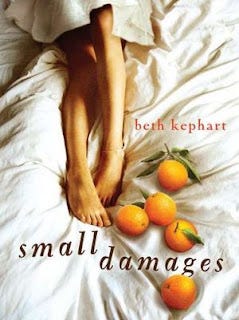
Small Damages, by Beth Kephart
From my review: When you read a Beth Kephart novel, you expect an immersion in color, in poetry and language, a sensory experience, an exploration into the heart. Small Damages is no exception. Here, we feel the heat of the Spanish sun; we hear the sizzle and pop of the onions in the pan while Estella prepares paella; we see the brilliant colors of the oranges and smell their fragrance. We feel Kenzie’s hurt and heartbreak; it is palpable on the page. (Since she has lost her dad, she might do well to become acquainted with Katie D’Amore, who lost her mom and who we met in Beth’s novel Nothing But Ghosts, which I reviewed here. They do reside in pretty close proximity on Philadelphia’s Main Line, after all.)
Through it all, we go to Spain and back again within the folds of a story that is laden with symbolism and meaning – For it is impossible to miss the religious symbolism and life and death undertones in Small Damages.
It’s more prevalent here than in any other of Beth’s books I’ve read, yet is handled beautifully and with such grace. From the presence of the nuns “blackbirding by” to the visits to Necropolis to Kenzie’s mother’s declarations of what to do about the baby (“I’m calling Dr. Sam. We’re going to fix this.” “Fix it?” I said), to Miguel’s bulls that will soon be taken away, to Kenzie’s tender interactions of addressing the baby directly, to the birds (including actual STORKS!), to the storyline about adoption, to Estela’s exclamations of Santa Maria, madre de Dios. All this, sometimes even within several paragraphs.
In this life, none of us escapes unscathed. We’re all left with damages, small and large. Through Kenzie’s eyes, we see those and those of the people in her midst. We see the sting of regret, but we also see the power of choices. Small Damages reminds the reader that even when we think they aren’t, our choices are still there, always ours for the making. (read more)

The Lola Quartet, by Emily St. John Mandel
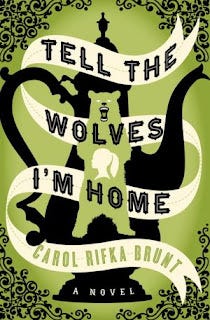
Tell the Wolves I’m Home, by Carol Rifka-Brunt
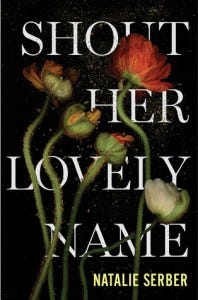
Shout Her Lovely Name, by Natalie Serber
From my review: “She named her cat Phil Donahue, hoping he’d greet her the way Donahue ran to the women in his audience, eager to hear anything they had to say about seat belts, war, or divorce.” (“Manx,” pg. 86)
Bam. Sold.
(Because like the character Nora above, I too as a young girl watched Phil Donahue with my mom back in the day and I loved him. Still do.)
Natalie Serber had me as a new fan of her writing, thanks to her debut collection of stories, but give me a character who names their cat Phil Donahue – after (yes) the one and only talk show host Phil Donahue – and that’s someone who I absolutely want to spend time with. (read more)
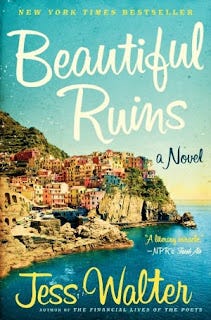
Beautiful Ruins, by Jess Walter
From my review: This is one of those rare books that you love all the way through – even until the end – and you’re holding your breath while frantically turning the pages of that ending hoping to God that the writer doesn’t do something godawfulstupid and screw up the preceding 300-some odd pages for you. (The ending had a “Six Feet Under” feel to it for me, which was just fine with me since I loved that show.) With the exception of one thing, it all comes together in the end, even though you, as the reader are wondering “how?” and saying “there’s no way he and she can …” or “the odds of this are absolutely impossible,” and it is simply captivating.
(OK, I’ll admit, even though I understand it in the context and theme of the novel, I was not pleased at the resolution with the square of Claire/Daryl/Shane/Sandra) at all, particularly the first three individuals. So, there.)
There are multiple layers here, stories within stories. Not only does this span decades – 1962 to the present day – but we as the reader travel throughout Italy (Porto Vergogna, Florence, Rome) and England, and to Hollywood and to Idaho and Seattle. Add in the dynamics of a real-life couple as volatile and complicated as Elizabeth Taylor and Richard Burton, and it is a rare writer indeed who can pull this off. In the hands of a much lesser talented novelist, this would be a disaster on the scale of “Cleopatra” itself. Fortunately, this is a Jess Walter Production, and he brings everything he has (and then some, and then some more) to this story, just as he did withThe Financial Lives of the Poets, which I loved.
Beautiful Ruins is spectacular, a masterpiece, an Oscar contender. If you love the movies, if you love a good love story, if you don’t mind a little romantic cry along with a laugh or two, if the thought of Italy makes you swoon, then Beautiful Ruins is for you too. (read more)
So there you have it: 13 books for ’13. Go forth into this bright new year and read.
I am an Amazon.com Affiliate. Making a purchase via any of the Amazon.com links on The Betty and Boo Chronicles will result in my earning a small percentage in commission, which will be used to support the upkeep of this blog, as well as the real-life versions of Betty and Boo. Thank you! copyright 2012, Melissa, The Betty and Boo Chronicles If you are reading this on a blog or website other than The Betty and Boo Chronicles or via a feedreader, this content has been stolen and used without permission.
The post The 13 Books You Should Read in 2013 first appeared on melissa firman.
No related posts.

